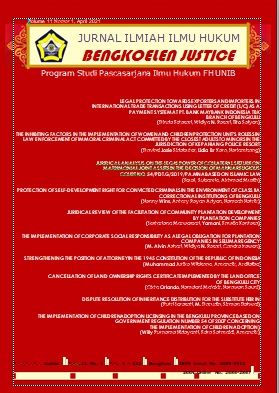Main Article Content
Abstract
This study was aimed to determine the settlement of disputes regarding the distribution of inheritance to substitute heirs left by their grandparents in terms of Islamic law and to determine the position of substitute heirs for the assets according to Al-Quran and Hadith provisions. The data collection technique used in this study was a normative legal research methodology based on a literature study. From this research, it is known that (a) The rights of grandchildren as substitute heirs to replace their deceased parents are the same as the rights which obtained by their mother's sister. It caused by the 2 sons and 3 daughters so that the distribution of inheritance is based on a ratio of 2:1. In accordance with the provisions of Q.S An-Nisaa'/7:4. To give the inheritance to a grandchild who replaces their deceased parents’ position, he/she can use a mandatory will so that he/she can receive the inheritance left by their grandparents. And if there is a dispute regarding the distribution of inheritance to the replacement heirs, it should be resolved by a mediation process as a tools of dispute resolution because it is considered as faster, easier, and less costly than the litigation process, (b) Al-Quran does not regulate the provisions regarding substitute heirs, but the Article 185 of the Islamic Law Compilation stipulates that the substitute heirs can replace their parents and the asset share of substitute heirs,must not exceed the share of the heirs which is equal to was replaced.
Keywords
Article Details
References
- Ahmad Rofiq, Hukum Perdata Islam di Indonesia EdisiRevisi, PT Raja Grafindo Persada, Jakarta, 2015.
- Ahmad Zahari, Tiga Versi Hukum Kewarisan Islam, Syafi’i, Hazairin dan KHI, Romeo Grafika, Pontianak, 2006, quoted from Eko Setiawan, Penerapan Wasiat Wajibah Menurut Kompilasi Hukum Islam (KHI) Dalam Kajian Normatif Yuridis, Muslim Heritage, Vol. 1, No. 2, 2016.
- Amir Syarifuddin, Hukum Kewarisan Islam, PT AdhityaAndrebina Agung, Jakarta, 2004.
- Anshary, Hukum Waris Islam Dalam Teori dan Praktik, Pustaka Belajar, Yogyakarta, 2013, p. 87, quote from Eko Setiawan, Penerapan Wasiat Wajibah Menurut Kompilasi Hukum Islam (KHI) Dalam Kajian Normatif Yuridis, Muslim Heritage, Vol. 1, No. 2, 2016.
- Fahmi Amruzi, Rekonstruksi Wasiat Wajibah dalam Kompilasi Hukum Islam, Aswaja Pressindo, Yogyakarta, 2014, p. 77, quoted from Eko Setiawan, Penerapan Wasiat Wajibah Menurut Kompilasi Hukum Islam (KHI) Dalam Kajian Normatif Yuridis, Muslim Heritage, Vol. 1, No. 2, 2016, p. 45.
- Gunawan Widjaja, Alternatif Penyelesaian Sengketa, PT Raja Grafindo Persada, Jakarta, 2002.
- Husain Musa Raghib, Mausu'ah Al-Iqtishad al-Islami fil-Masharif wan-Nuqud wal-Aswaq al-Maliyah,Daras-Salam, Cairo, 2009.
- Translate of Web, Surat Al-Hujurat Verse 9, accessed on 5 June 2020 from:https://tafsirq.com/49-al-hujurat/ayat-9
- WirjonoProdjodikoro, Hukum Warisan di Indonesia, Sumur Bandung, Bandung, 1991.
- Web Translate of Surat An-Nisa Verse 7, accessed on January 28, 2020 from https://tafsirweb.com/1540-surat-an-nisa-ayat-7.html
References
Ahmad Rofiq, Hukum Perdata Islam di Indonesia EdisiRevisi, PT Raja Grafindo Persada, Jakarta, 2015.
Ahmad Zahari, Tiga Versi Hukum Kewarisan Islam, Syafi’i, Hazairin dan KHI, Romeo Grafika, Pontianak, 2006, quoted from Eko Setiawan, Penerapan Wasiat Wajibah Menurut Kompilasi Hukum Islam (KHI) Dalam Kajian Normatif Yuridis, Muslim Heritage, Vol. 1, No. 2, 2016.
Amir Syarifuddin, Hukum Kewarisan Islam, PT AdhityaAndrebina Agung, Jakarta, 2004.
Anshary, Hukum Waris Islam Dalam Teori dan Praktik, Pustaka Belajar, Yogyakarta, 2013, p. 87, quote from Eko Setiawan, Penerapan Wasiat Wajibah Menurut Kompilasi Hukum Islam (KHI) Dalam Kajian Normatif Yuridis, Muslim Heritage, Vol. 1, No. 2, 2016.
Fahmi Amruzi, Rekonstruksi Wasiat Wajibah dalam Kompilasi Hukum Islam, Aswaja Pressindo, Yogyakarta, 2014, p. 77, quoted from Eko Setiawan, Penerapan Wasiat Wajibah Menurut Kompilasi Hukum Islam (KHI) Dalam Kajian Normatif Yuridis, Muslim Heritage, Vol. 1, No. 2, 2016, p. 45.
Gunawan Widjaja, Alternatif Penyelesaian Sengketa, PT Raja Grafindo Persada, Jakarta, 2002.
Husain Musa Raghib, Mausu'ah Al-Iqtishad al-Islami fil-Masharif wan-Nuqud wal-Aswaq al-Maliyah,Daras-Salam, Cairo, 2009.
Translate of Web, Surat Al-Hujurat Verse 9, accessed on 5 June 2020 from:https://tafsirq.com/49-al-hujurat/ayat-9
WirjonoProdjodikoro, Hukum Warisan di Indonesia, Sumur Bandung, Bandung, 1991.
Web Translate of Surat An-Nisa Verse 7, accessed on January 28, 2020 from https://tafsirweb.com/1540-surat-an-nisa-ayat-7.html

